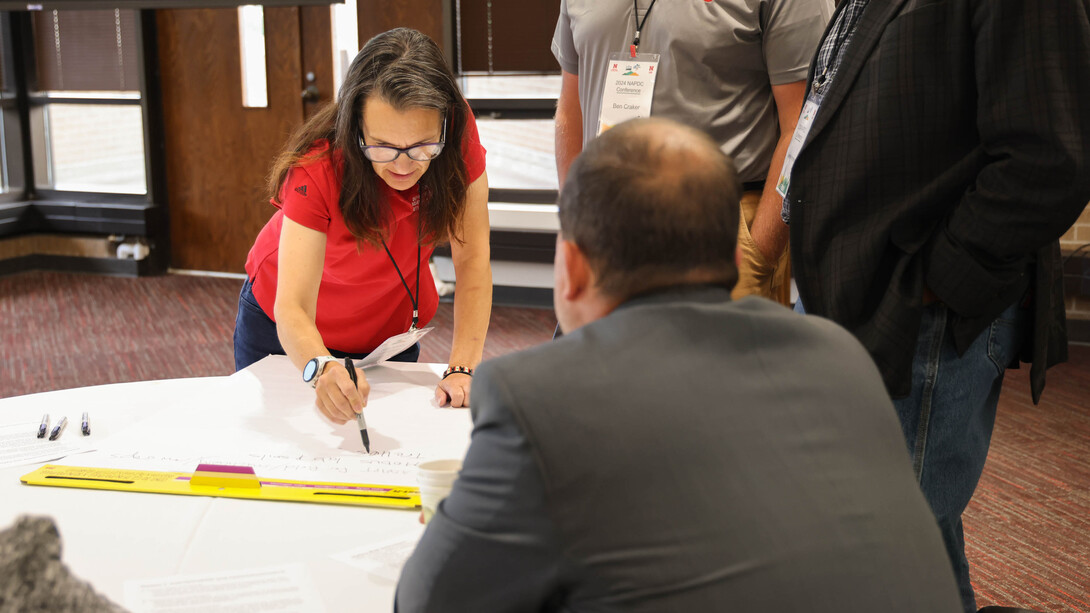
Faculty from the University of Nebraska–Lincoln are leading a federally funded initiative to develop a national cyber-ecosystem for agricultural producer data. The project recently advanced with a strategic visioning session during a national planning conference in Lincoln.
The National Agricultural Producers Data Cooperative conference, held Aug. 8-9 on UNL’s East Campus, featured academics, industry scientists and representatives from producer groups. Objectives discussed include outreach and coordination with ag producers and industry; collaboration among successful existing data projects; and strategies to enable the projects’ long-term viability.
Jennifer Clarke, who is part of a group of Husker faculty leading the initiative, said the meeting was productive.
“The main takeaway is we are solving and will continue to solve problems for producers around data,” said Clarke, professor of statistics and food science and technology, and director of UNL’s Quantitative Life Sciences Initiative. “That is really the value of bringing this group together — prioritizing what problems to solve for now and the future.”
The initiative has been funded since 2021 by the U.S. Department of Agriculture’s National Institute of Food and Agriculture. Its primary goal is to equip producers with tools and services to manage and access their ag data with adequate privacy and security assurances.
A central theme of the conference was the importance of providing “useful data” to farmers and ranchers nationwide.
“It is important to engage the producer community and let them know that what we are bringing to them is of value,” Clarke said. “We're solving problems. We have software. We have hardware. We need to communicate to producer communities that this is what tangibly we have right now.”
Matt Spangler, professor of animal science and a beef genetics specialist who is helping lead the initiative, highlighted the financial considerations of data handling in the private sector.
“In industry, the only way data sharing is sustainable is if the people collecting and sharing the data see that it returns something that they need to take decisions on or inform sales in their enterprise on a day-to-day basis,” he said. “It has to deliver something back.”
The initiative’s impact is already being felt through pilot projects funded across the country. Joe Luck, professor of biological systems engineering and associate director of the university’s Eastern Nebraska Research, Extension and Education Center, said the projects show how data can be better utilized by producers, ranchers and feedlot operators. They also reinforce the value of collecting, storing and sharing ag data for practical use, Luck said.
“There are companies that understand there’s value out there now, because they’re creating these data ecosystems of their own,” Luck said. “There has to be a place where universities can interact there more easily, and just showing the farmers in my area that there is value to that digital record is really important. I think we’ve seen that through some of these pilot projects.”
Trenton Franz, professor of hydrogeophysics and associate director of research for the School of Natural Resources, emphasized the importance of case studies that are providing concrete examples of value for producers.
“Now, we can go back to creating a white paper strategic plan with some more structure and scaffolding for the project,” he said.
Other key Husker faculty involved in the project include Scout Calvert, research data librarian, and Hongfeng Yu, professor of computing and director of the Holland Computing Center.
A critical next step involves connecting existing projects to foster collaboration and facilitate further progress.
“We also want to synthesize feedback from this conference and develop a strategic plan for the next three to five years that will guide ecosystem development,” Clarke said.
Many of the current projects “are really bringing value,” she said, and the USDA-funded initiative will work to promote their long-term viability. “That way, the value to those producers is going to be there in the future.”
More details at: https://news.unl.edu/article/husker-faculty-lead-conference-honing-strategies-for-national-ag-data-network